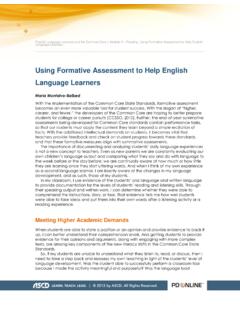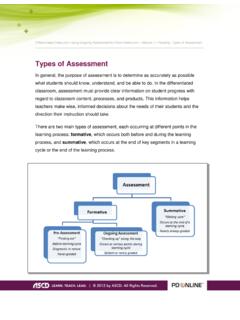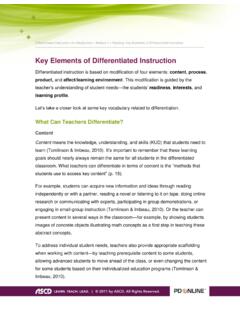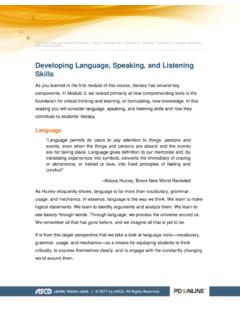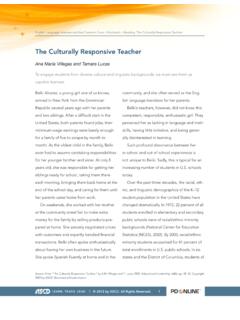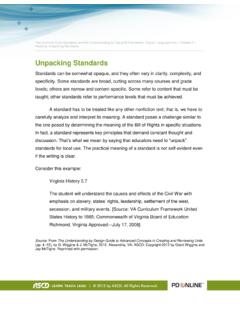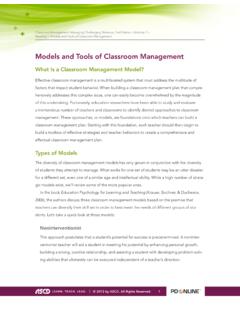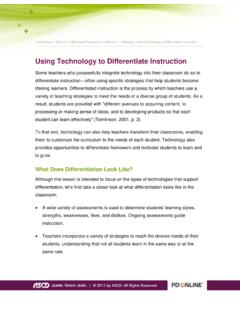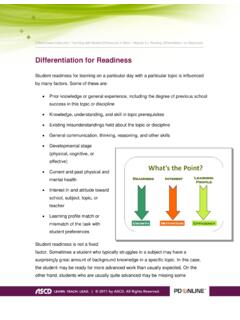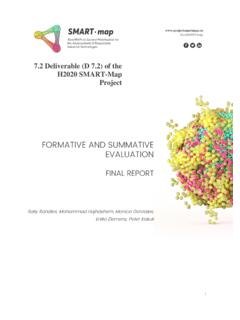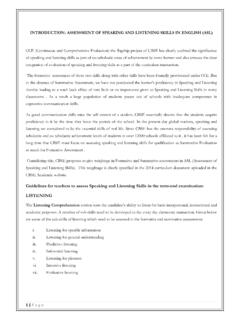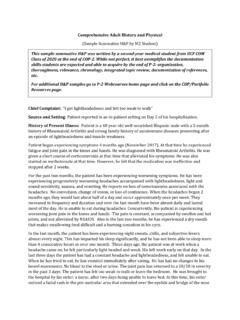Transcription of What Is Performance Assessment? - ASCD
1 assessment : Designing Performance Assessments > Module 2 > Reading: What Is Performance assessment ? _____ What Is Performance assessment ? The various forms of assessment have their purposes when administered and evaluated at the right place and time. Teachers are fully familiar with standardized state and national tests. These tests usually evaluate student knowledge on a given day in a standardized way, meaning every student takes the same test. Yet higher-level thinking and application of knowledge can be difficult to assess in the format of traditional tests. In other words, traditional assessments answer the question Do you know it? Performance assessment , on the other hand, answers the question How well can you use what you know?
2 Performance assessment Defined Performance assessment involves the demonstration and application of knowledge, skills, and work habits through what is known as a Performance task. It is important that the task be meaningful and engaging to students. Tasks built around student interests engage students and help them make connections to their personal lives. To make tasks meaningful to students, provide an authentic audience to whom they will present their knowledge. This gives them a purpose to apply effort to the task. When students perform tasks that are meaningful and engaging to them, they are able to take ownership of their learning and effectively work, either independently or in collaboration, depending on the requirement of the task.
3 The core purpose of Performance assessment is not to render an evaluation, but to improve student learning ( Performance assessment Series, Middle School Edition, 2001). This learning is accomplished when a student demonstrates his or her understanding AND communicates that understanding through written or oral assessment : Designing Performance Assessments > Module 2 > Reading: What Is Performance assessment ? _____ presentations. Performance assessment can be used as either a formative or summative tool. For example, a Performance assessment built around a complex reasoning task, such as problem solving or decision making, requires the synthesis of information from multiple sources.
4 As students sort through the information and draw conclusions, a teacher can observe students reasoning skills in action and, if necessary, provide support to those who are struggling. This would be a type of formative assessment . The students final presentations, on the other hand, may be judged based on a rubric and given a score. That would be an example of using a Performance task as a summative assessment . Construction of Performance Assessments Before constructing Performance assessments, think about what students will need to become proficient in the domain or discipline you are teaching. Consider these questions before constructing the task: What essential questions are guiding your instruction and assessment ?
5 How much time will you allow students to complete the task, knowing that all students do not work or learn at the same pace? What scenario from the real world will be meaningful and engaging for students? Consider a unit on World War II conflicts. Essential questions may include What are some causes of conflict between countries, and Do all conflicts between countries result in war? A unit on such a broad topic could take as long as two-three weeks, depending on the depth and breadth of the assessment chosen. An interesting scenario around which to build a Performance assessment might be to consider the assessment : Designing Performance Assessments > Module 2 > Reading: What Is Performance assessment ?
6 _____ inner conflict of an Asian-American teenager living in a confinement camp during World War II. Consider These Questions as You Draft and Revise the Task What content standards are you assessing? Which complex reasoning process will the task be structured around? (For example: decision-making, investigating, problem-solving) Which standards covering habits of mind or collaboration and cooperation should be included? Which standards covering forms of communication will be assessed? What materials or resources should be made available for students to successfully complete the task? Continuing with the example above, a history standard that could drive this Performance assessment is the student engages in historical issues-analysis and decision-making.
7 In this unit, students will have to analyze the reasons America entered World War II and the consequences of that decision. One way to make this assessment authentic for students might be to have them write an article for a teen magazine about the experience of an Asian-American teenager living in a confinement camp during World War II. Using complex reasoning processes, such as analysis and decision-making, are required when the student determines which facts are needed for the article and how the information will be presented, as a narrative or an informative piece, for example. The written article and identified audience meets several communication standards students are expected to achieve while in school.
8 As one can see, the process of developing an authentic Performance assessment requires some creativity and carefully made decisions. assessment : Designing Performance Assessments > Module 2 > Reading: What Is Performance assessment ? _____ Rigor and Relevance If the goal of Performance assessment is to give students opportunities to apply their knowledge and skills to complex, real-world problems or tasks, it is important to ensure that the tasks you develop are both intellectually rigorous and relevant to students. Rigor and relevance are key characteristics of good Performance assessments. Think about the higher levels of Bloom s Taxonomy of Knowledge: application, analysis, synthesis, and evaluation.
9 These levels represent complex ways individuals use knowledge. To ensure that rigor and relevance is present in a Performance assessment , have students combine many pieces of information in logical and creative ways. In other words, have them apply, analyze, synthesize, and evaluate information in order to present it to someone else. There are many ways to evaluate the rigor and relevance of a Performance assessment you are designing. One method is the Application Model created by Dr. Willard R. Daggett of the International Center for Leadership in Education. His four-quadrant model allows teachers to plot where their assignments lie on axes of rigor, using Bloom s Taxonomy, and real-world relevance, moving from the simple and predictable to the complex and unpredictable.
10 Daggett suggests that applying multi-faceted, interdisciplinary knowledge to real-world, unpredictable situations show the highest level at which students can demonstrate conceptual understanding ( ). To see Daggett s Rigor/Relevance framework, go to
